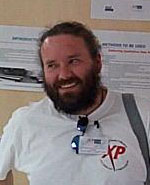| |
|
|
CONTACT JAOO
JAOO Conference
Scandinavian Center
Margrethepladsen 3
DK-8000 Aarhus C
Tel.:+45 87 32 87 87
Fax: +45 87 32 87 88
VAT: 25809149
jaoo@jaoo.dk
|

|
|
|
 |
|
Speaker
|
Dave
Astels
Adaption Software Inc.
Dave Astels has been developing hardware and software solutions for more
than 20 years in domains ranging from environment control systems to
electrical energy trading systems to mass market products. Since the late
1980s he has been working exclusively with object technologies: a mix of
C++, Smalltalk, Java, and some more obscure OOPLs. Since the late 1990s,
he has been studying, using, evangelizing, and teaching Agile Development
processes and practices. He has coauthored/authored two books for Prentice
Hall: "A Practical Guide to eXtreme Programming" and "Test-Driven
Development: A Practical Guide". He also edits the TDD edition of The Coad
Letter, which is part of the Borland Development Network. He co-founded
and runs Adaption Software, Inc.
|

|
|
Tutorial: "Advanced TDD topics"
Friday 13:00 - 16:00
Test-driven Development (TDD) is a cornerstore of XP. Without TDD in place, most of the other practices are difficult or impossible (e.g. refactoring, continuous integration, ...). While writing a complete suite of programmer tests for your software is good, writing them first is better.
However, the benefits of practicing TDD are not limited to XP, and can be realized in any Agile (and even some non-Agile) contexts. TDD helps make our code better, regardless what amount of design or modeling has been done before programming begins. It's a generally useful technique to have in our bag of tricks.
This tutorial will provide an introduction to TDD showing how it works and what benefits it provides. The tutorial will be conducted using Java and JUnit.
The tutorial follows a basic introduction to TDD. This session is on keeping test code clean and Mock Objects (what they are and how to use them).
The first session on the basics will be of interest to programmers new to TDD or the use of JUnit. The second session will appeal to those familiar with the basics of TDD.
Since this is a hands-on tutorial, attendees are strongly encouraged to bring along their laptops so that they can learn as much as possible by actually test-driving some code. That said, attendees are encouraged to work in pairs, using either one or two computers.
A Java 2 compliant development environment (with J2SE 1.3.1 or later) and jUnit 3.8 (or later) should be installed and configured prior to the tutorial. The instructor will be demonstrating using the most recent versions of Eclipse (currently 2.1) and JUnit (currently 3.8.1).
For this session , MockObjects and EasyMock will also be required. Details on the required software can be bound at www.adaptionsoft.com, along with links to where it can be downloaded.
|
|
Tutorial: "Basic TDD/Junit techniques"
Friday 09:00 - 12:00
Test-driven Development (TDD) is a cornerstore of XP. Without TDD in place, most of the other practices are difficult or impossible (e.g. refactoring, continuous integration, ...). While writing a complete suite of programmer tests for your software is good, writing them first is better.
However, the benefits of practicing TDD are not limited to XP, and can be realized in any Agile (and even some non-Agile) contexts. TDD helps make our code better, regardless what amount of design or modeling has been done before programming begins. It's a generally useful technique to have in our bag of tricks.
This tutorial will provide an introduction to TDD showing how it works and what benefits it provides. The tutorial will be conducted using Java and JUnit.
The tutorial is followed by an advanced tutorial, and they are divided like this:
This session: Basic TDD
Writing basic tests and suites. The TDD flow and rhythm.
Session 2: Advanced TDD
Keeping test code clean and Mock Objects (what they are and how to use them).
This session will be of interest to programmers new to TDD or the use of JUnit. The second session will appeal to those familiar with the basics of TDD.
Since this is a hands-on tutorial, attendees are strongly encouraged to bring along their laptops so that they can learn as much as possible by actually test-driving some code. That said, attendees are encouraged to work in pairs, using either one or two computers.
A Java 2 compliant development environment (with J2SE 1.3.1 or later) and jUnit 3.8 (or later) should be installed and configured prior to the tutorial. The instructor will be demonstrating using the most recent versions of Eclipse (currently 2.1) and JUnit (currently 3.8.1).
For session 2, MockObjects and EasyMock will also be required. Details on the required software can be bound at www.adaptionsoft.com, along with links to where it can be downloaded.
|
|
|
|
|

